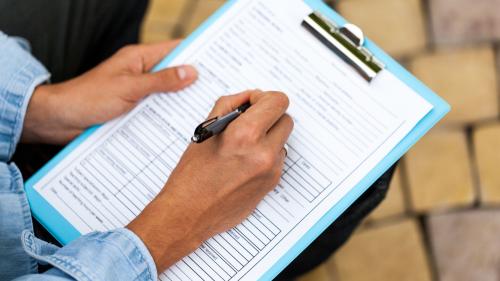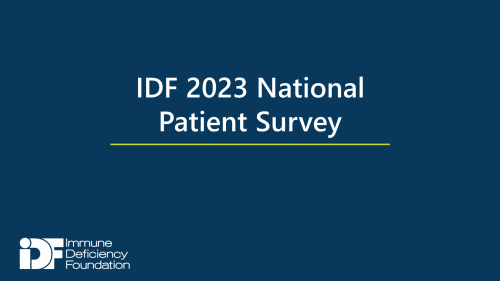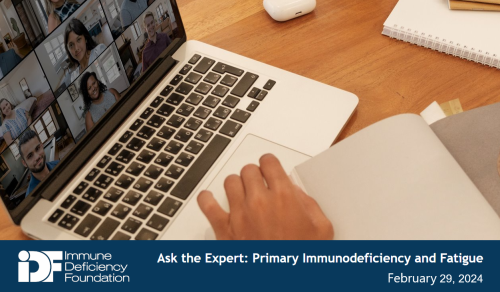
-
Understanding primary immunodeficiency (PI)

Understanding PI
The more you understand about primary immunodeficiency (PI), the better you can live with the disease or support others in your life with PI. Learn more about PI, including the various diagnoses and treatment options.
-
Living with PI
-
Addressing mental health
-
Explaining your diagnosis
- General care
- Get support
- For parents and guardians
-
Managing workplace issues
- Navigating insurance
-
Traveling safely

Living with PI
Living with primary immunodeficiency (PI) can be challenging, but you’re not alone—many people with PI lead full and active lives. With the right support and resources, you can, too.
-
Addressing mental health
-
Get involved

Get involved
Be a hero for those with PI. Change lives by promoting primary immunodeficiency (PI) awareness and taking action in your community through advocacy, donating, volunteering, or fundraising.
-
Advancing research and clinical care
-
Grants
-
IDF surveys
-
Participating in clinical trials
-
Diagnosing PI
-
Consulting immunologist
-
Clinician education

Advancing research and clinical care
Whether you’re a clinician, researcher, or an individual with primary immunodeficiency (PI), IDF has resources to help you advance the field. Get details on surveys, grants, and clinical trials.
-
Grants
About half of all people diagnosed with chronic granulomatous disease (CGD) develop colitis, an inflammatory bowel disease (IBD) that causes abdominal pain, diarrhea, fatigue, and unintended weight loss. Because traditional treatment such as steroids poses risk to people with CGD, researchers at the National Institutes of Health (NIH) aim to determine if fecal microbiota transplantation (FMT) is a better option.

In FMT, researchers place a small amount of donor stool containing healthy bacteria into a patient’s intestine through a colonoscopy. The goal is to replace the patient’s imbalanced gut biome, which leads to inflammation and colitis, with a healthy gut biome that relieves the symptoms.
The NIH is currently enrolling patients with CGD colitis, ages 10 to 60, in its clinical trial to test the effectiveness of FMT as a treatment for IBD.
“What’s unique about the CGD population with IBD compared to regular inflammatory bowel disease is the limited treatment options. In regular IBD, the treatment is a lot of immunosuppressive drugs to bring down the inflammation, and they work well but we are rather hesitant to use those kinds of medicines in patients with CGD because they are already immunocompromised,” said Dr. Suchitra Hourigan, pediatric gastroenterologist, NIH Clinical Microbiome Unit Chief, and lead investigator on the study.
“We don’t want to increase further their risk of infections, which is why we’re trying to look for different types of therapies that don’t suppress the immune system and fecal transplant is one of them.”
Persons with CGD develop colitis due to autoimmunity, a condition in which the body attacks its own tissues and organs. In the case of a person with CGD, a common autoimmune problem is bowel inflammation. Bowel inflammation symptoms can range from mild stomach pain and diarrhea to bloody diarrhea that prevents a person from getting proper nutrition, leading to hospitalization.
“There’s a range of symptoms, but generally, it can have significant effects on your quality of life and also your ability to go to school and work,” said Hourigan. “When children are affected, they may not grow very well because they don’t get the nutrition they need during that critical period of growth and puberty, so they may not reach their potential height, which also has social consequences.”
Though using one person’s stool to improve the gut biome in another person may seem unusual and perhaps unsafe, Hourigan said that stool donors undergo rigorous screening and that Open-Biome, the organization NIH obtains the stool from, accepts only three percent of potential donors.
 Open-Biome determines potential donors using two layers of screening. They don’t accept donors with conditions associated with imbalanced microbiomes or bad bacteria, such as autoimmunity, obesity, high blood pressure, and cardiovascular disease. They also screen donors for specific micro-organisms that may cause diseases like Shigella spp. and Helicobacter pylori, and most recently, COVID-19 and monkeypox.
Open-Biome determines potential donors using two layers of screening. They don’t accept donors with conditions associated with imbalanced microbiomes or bad bacteria, such as autoimmunity, obesity, high blood pressure, and cardiovascular disease. They also screen donors for specific micro-organisms that may cause diseases like Shigella spp. and Helicobacter pylori, and most recently, COVID-19 and monkeypox.
“The donors picked are really chosen to transfer the healthiest microbiome,” said Hourigan.
FMT shows promise in treating other types of colitis, such as Crohn’s disease and ulcerative colitis, and is known to be effective in treating a bacterial infection called Clostridioides difficile infection, also known as C. diff. C. diff causes diarrhea and significant colon inflammation and can be potentially life-threatening.
“For C. diff, they started with fecal transplants, which are very effective, and then they narrowed it down to determine which bacteria or group of bacteria were specifically effective to treat C. diff and then made a product for it,” explained Hourigan. “In fact, the Food and Drug Administration (FDA) approved the first live biotherapeutic product derived from human stool last week to treat C. diff.”
The NIH clinical trial is the first-ever study to see if restoring the gut microbiome reduces colitis symptoms in CGD. Researchers intend to enroll 10 participants, and so far, they have one patient treated, with several more due to be enrolled in the next few months.
Participants undergo a telehealth screening visit and medical record and medical history review and send stool samples to the NIH. If accepted into the trial, they stay at the NIH for three to five days for treatment and testing and, afterward, have nine follow-up telehealth visits over six months.
“The first thing we want to do is to make patients feel better. If it does work, then we will take a deep dive into the microbiome and the products it produces because we collect stool samples all along the way to find out what’s changed and how it correlates with that patient feeling better, and that’s the first step to making those more targeted products,” said Hourigan.
For more information and to see if you are eligible to enroll in the study, contact Dr. Suchitra Hourigan at suchitra.hourigan@nih.gov.
Sign up for updates from IDF
Receive news and helpful resources to your cell phone or inbox. You can change or cancel your subscription at any time.





The Immune Deficiency Foundation improves the diagnosis, treatment, and quality of life for every person affected by primary immunodeficiency.
We foster a community that is connected, engaged, and empowered through advocacy, education, and research.
Combined Charity Campaign | CFC# 66309




